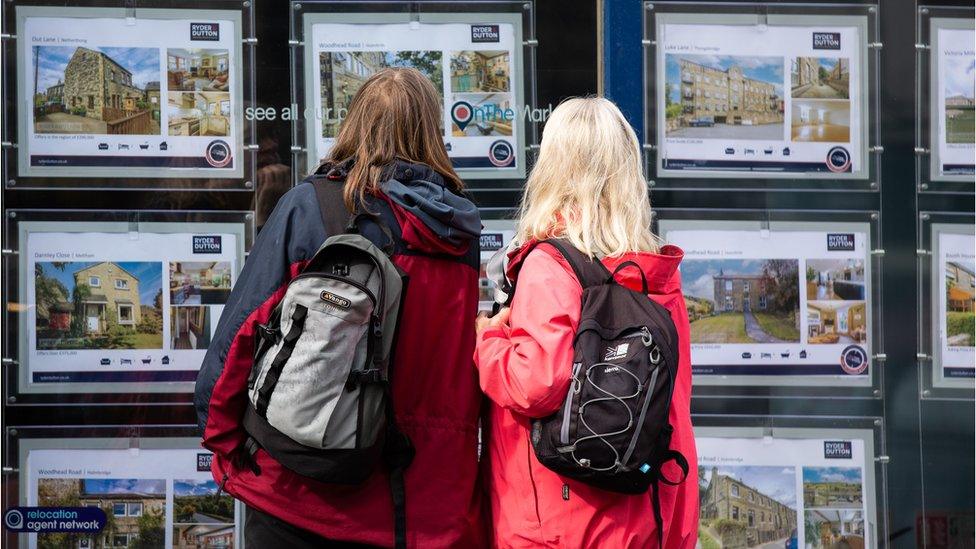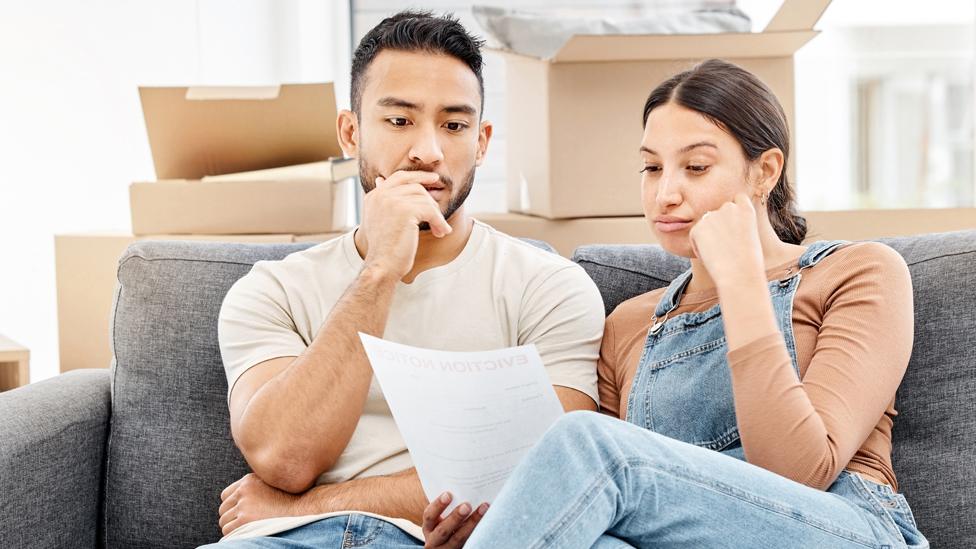Mortgage help 'under review', says Michael Gove
- Published
- comments
Watch: Mortgage help under review, says housing secretary
Help for people struggling with their mortgages is being kept "under review", cabinet minister Michael Gove has said.
But any financial assistance would be a decision for the Treasury, he told Laura Kuenssberg.
He also warned any help similar to Covid or energy bill schemes risked driving up interest rates further.
The BBC understands that the Treasury has no current plans to give mortgage relief.
It comes as the average interest rate on a new two-year fixed mortgage is likely to breach 6% in the coming days as lenders grapple with upheaval in the sector.
Asked on Sunday with Laura Kuenssberg whether the government would consider stepping in to help those struggling to repay their loans, Mr Gove said there is a "difference between keeping under review and ruling out" a scheme similar to the wage support given during Covid.
But he said that using public money to "deal with particular crises" inevitably added to public debt, which put pressure on interest rates.
"The worst thing to do would be to spend money to provide a short-term relief which would then mean that our overall finances were in a weaker position, and interest rates were higher for longer, and inflation was higher for longer," Mr Gove added.
'Significant increases'
Mortgage rates have been climbing as the Bank of England puts up interest rates to try to control inflation.
It means people re-mortgaging face sharp increases in their repayments, while the purchasing power of first-time buyers is squeezed.
According to new figures from financial data firm Moneyfacts, a person fixing a £250,000 mortgage for five years back in 2018 would have paid an average rate of 2.92%, or £1,175 per month.
Today the average rate is 5.62%, with a monthly payment of £1,553. That's £378 per month more, or nearly £23,000 more over the five-year term.
Mr Gove acknowledged people moving off fixed-rate deals faced "significant increases" along with broader cost-of-living pressures.
But he said the best way to tackle this was to bring down inflation.
A Treasury source added that a bailout for homeowners would be "self-defeating" because it would push up inflation and prompt the Bank of England to further raise interest rates.
The Sunday Times reported, external that the Treasury has ruled out mortgage support for this and other reasons. Instead, it will ask banks to do more to stop people losing their homes.
'Exhausting and very stressful'
David Husbands, 43, a property valuer from Chester-le-Street in County Durham, said his rising mortgage payments were "crippling" him.
His payments have gone from about £300 per month in early 2022 to more than £600.
"Because interest rates have gone sky high I'm lucky if I'm left with £100 to live off at the end of each month," he said. "I've had to take on extra casual work elsewhere."
He is finding the situation "exhausting" and "very stressful", finishing work at 5:30pm, then doing gigs as a casual DJ until midnight.
He fell into negative equity during the financial crash of 2008, and doesn't have enough money to renovate the house to sell it to "at least break even".
David and his husband have also put adoption plans on hold.
"Right now we don't feel confident to be able to give a child a secure, safe and comfortable home," he said.
Support prospects
The idea of the government providing help for mortgage customers is more nuanced than the furlough jobs scheme or recent Energy Price Guarantee.
While those were universal, less than 30% of UK households have a mortgage.
Providing support for them risks alienating older voters who own their homes outright, and younger people who cannot even afford to buy.
That is why the government is not entirely ruling out some kind of support for homeowners, but sticking to its key pledge to bring inflation down to below 5%.
In theory that would ease everyday costs for every household.
However, ministers are desperate to get the economy firing, and if millions of people soon have to pay hundreds of pounds a month extra in their mortgage costs, that is money which they won't spend on eating out, buying goods or holidaying.
With a growing number of mortgage customers now getting into arrears, and repossessions increasing sharply in recent months, it is a worrying time for millions of households, with no easy answers.

What happens if I miss a mortgage payment?
A shortfall equivalent to two or more months' repayments means you are officially in arrears
Your lender must then treat you fairly by considering any requests about changing how you pay, perhaps with lower repayments for a short period
Any arrangement you come to will be reflected on your credit file - affecting your ability to borrow money in the future

Related topics
- Published18 June 2023
- Published17 June 2023

- Published16 June 2023

- Published11 June 2023
